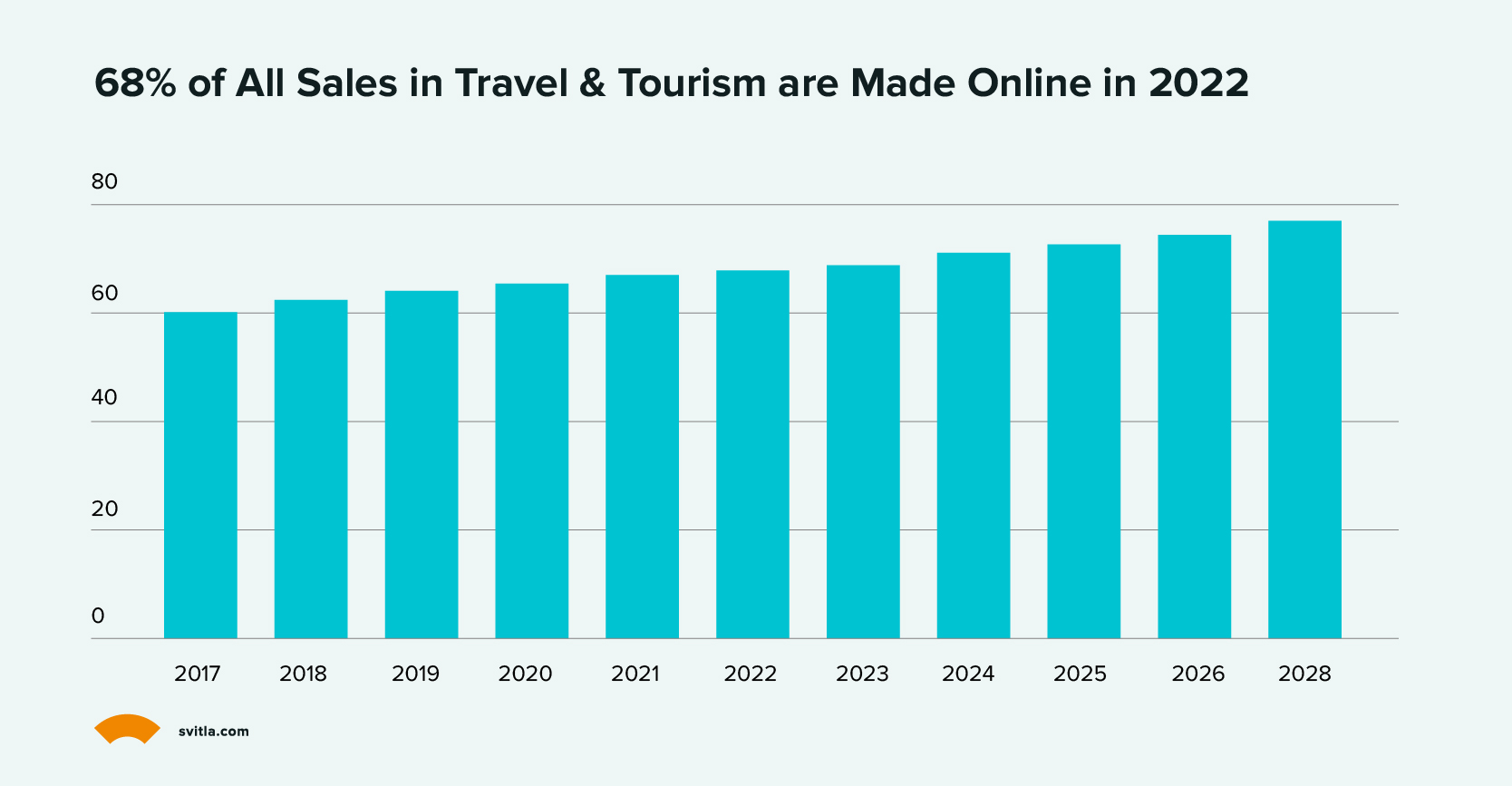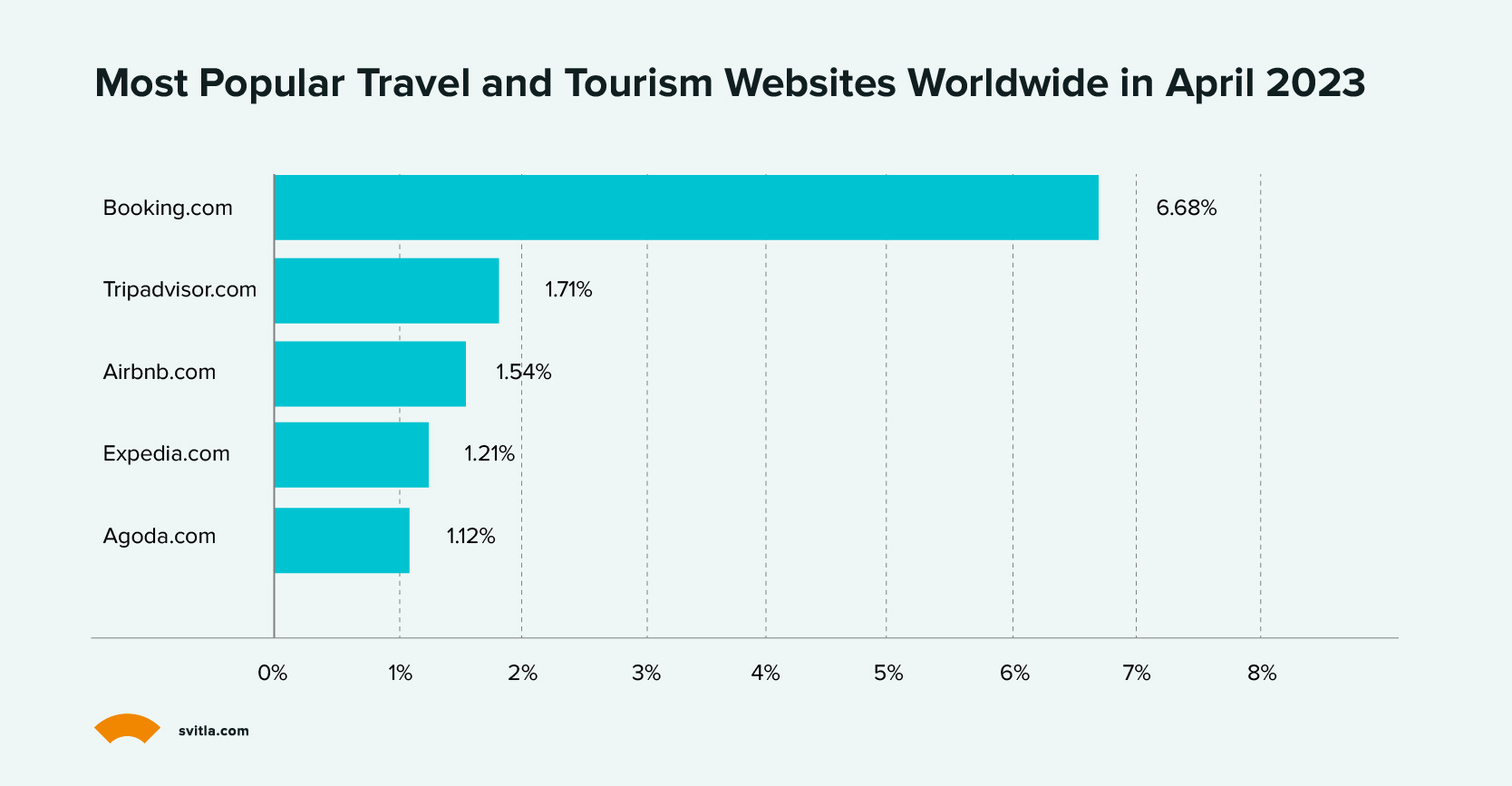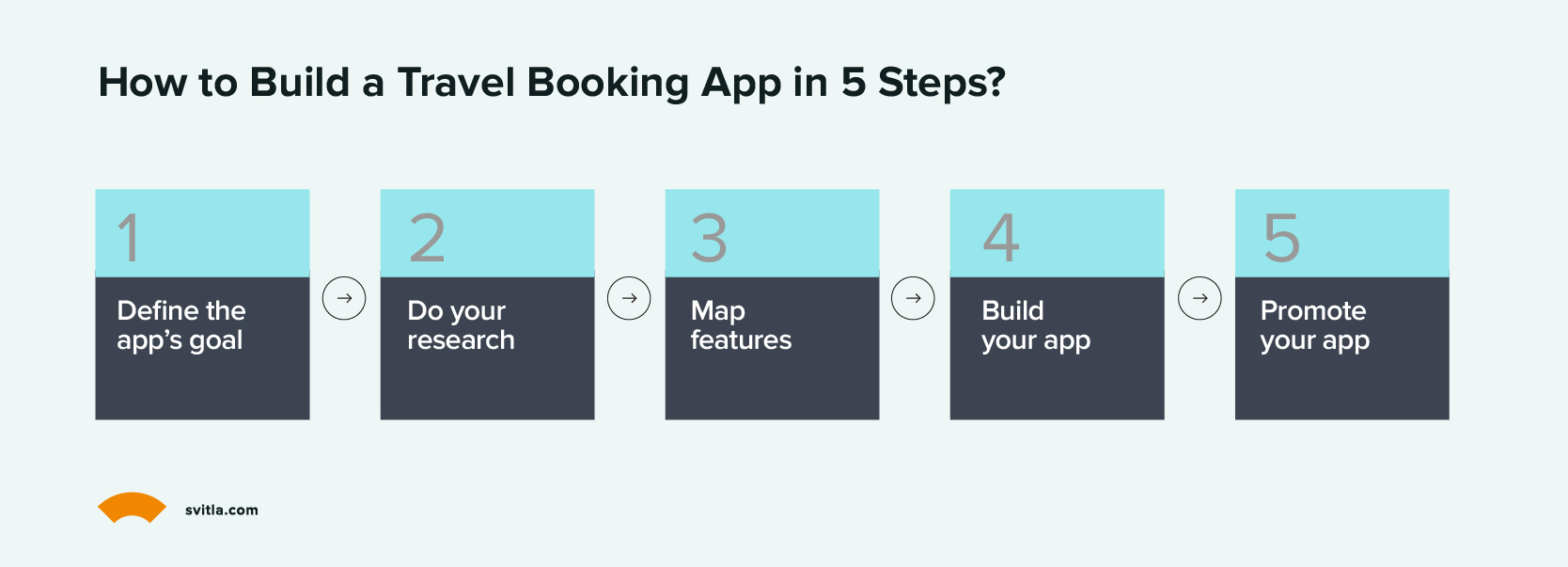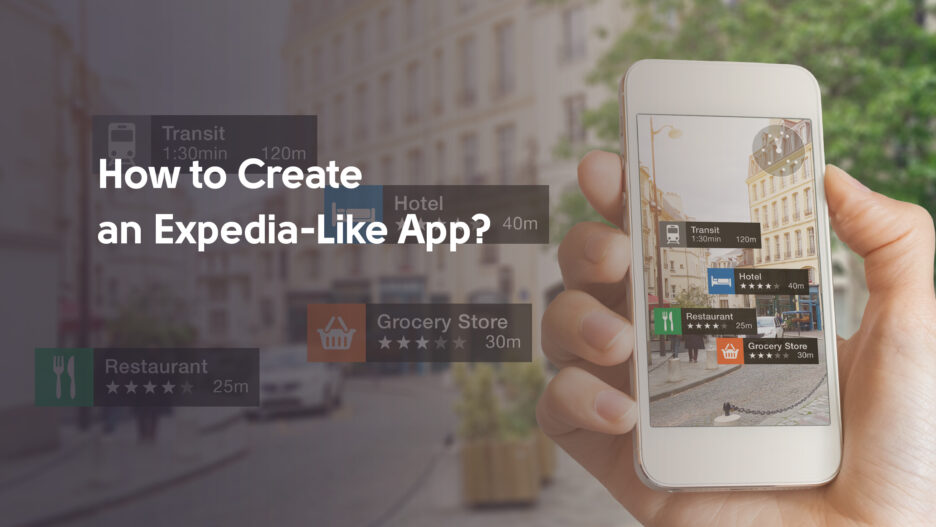Smartphones and travel apps have changed how we plan and go on trips. Apps make everything easier – choosing what to do, booking flights and hotels, getting around in new places. You don't need travel agents as much anymore.
With so many traveling with smartphones in hand, travel app development services have enormous potential. An effective travel app understands user needs and pain points, providing utility through intuitive features. Successful apps draw on the strengths of mobile technology to enhance time-sensitive travel activities.

In this guide, we explain how to make a successful travel app, overview existing solutions, discuss possible features, monetization models, and beyond. Let the journey begin!
What is a Travel Booking App?
Travel booking service is an application that allows users to browse, compare, select, and book accommodation via their devices. The user's convenience is its key priority. So, they usually offer advanced search options. In this way, people can filter hotel rooms by price, location, the number of stars, etc. The app shows users pictures and details to help them pick what they like.
A hotel booking app offers numerous advantages for both tourists and hoteliers. Now, let’s briefly overview how each side benefits from them.
Benefits for hotel owners:
- Helping the hotel to be seen by more people, leading to more bookings and money.
- Allowing hotels to give customized suggestions and offers to guests. A travel booking app also lets them get direct feedback.
- Automation of payments, pricing, and room availability. This saves the hotel time and money.
- Increasing direct hotel bookings and, ultimately, saving money.
- Improving overall customer experience.
Benefits for tourists:
- More accessible booking through the app than calling hotels or websites.
- Up-to-date info on pricing, rooms, and amenities when booking last minute.
- Competitive deals and discounts to encourage future bookings and increase customer loyalty.
- Simple, easy-to-use interfaces improve the digital guest experience.
Key Travel Market Players
In travel, a few big companies are game-changers for now. Let’s overview some of the most prominent market players and explore what makes them successful.
Booking.com
Booking.com is a leading Dutch startup with a presence in over 70 countries. The app offers diverse accommodation options like high-end hotels, private beach resorts, cozy homestays, and standard rooms. Users can tailor their search by filtering results based on price, amenities, city, ratings, and more. The extensive database of 27 million properties and 135 million guest reviews provides a robust foundation for travelers to select their ideal stay.
In April 2023, Booking.com was the leading travel and tourism website based on a share of visits.
Device: Android / iPhone
Review score: Google Play: 4.6/5, Apple Store: 4.8/5

Airbnb
Airbnb lets property owners directly list and manage bookings from private rooms to entire homes. With open owner-guest communication, travelers can validate amenities and negotiate deals to meet their budget or needs. Critical features like Split Stays also provide flexibility for more extended visits. Furthermore, Airbnb differentiates itself through experiential additions – curated local activities led by hosts.
Device: Android / iPhone
Review score: Google Play: 4.5/5, Apple Store: 4.8/5
Agoda
Agoda is a Singaporean travel agency that offers a one-stop shop for booking flights, hotels, and vacation rentals. An inventory of 2.5 million options provides extensive choices to match any budget or preference. With 2.5 million options across the globe, they make it easy for people to find something perfect for every trip and budget imaginable.
Plus, Agoda understands that customer service matters when you're on the road and out of your comfort zone. Offering global 24/7 assistance is huge for giving travelers peace of mind.
Device: Android / iPhone
Review score: Google Play: 4.7/5, Apple Store: 4.8/5
Expedia
Expedia has cleverly become travelers’ one-stop portal, making dream trips incredibly affordable. Timed promotions, app exclusives, and rewards programs offer irresistible flight and hotel deals. Pair with bundling discounts, and costs keep plunging.
But understandably, people want more than rock-bottom prices – personalized experiences. Expedia delivers intuitive filtering tools and AI-powered suggestions to match unique travel missions, whether luxe honeymoons or backpacking adventures.
They’ve also smartly grown beyond travel staples into complete vacation servicing – rental cars, tours, show tickets...all bookable in one spot.
Device: Android / iPhone
Review score: Google Play: 4.3/5, Apple Store: 4.8/5
Hotels.com
Hotels.com anchors its value proposition on securing budget-friendly rates for travelers, enabled by its significant 1+ million property inventory across categories – from hotels and resorts to apartments and vacation homes.
However, pricing alone does not drive preference. Hotels.com looks to foster loyalty through an engaging rewards program that provides a free hotel night for every 10 bookings. Higher membership tiers unlock additional exclusives and travel upgrades as well.
Ease of use is also emphasized, with features allowing impulse, last-minute bookings. Likewise, free cancellation policies provide booking flexibility.
Device: Android / iPhone
Review score: Google Play: 4.2/5, Apple Store: 4.8/5
Core Functionality of Travel Booking App
Now that we know the key market players, let's look at the main features you must implement in your travel booking app.
For Users
- Log-in and sign-up. Allow travelers to seamlessly create personal accounts to manage preferences, bookings history, and customization features. Implement quick signup with social platforms or just phone/email to eliminate friction.
- Smart search. Intelligent algorithms enable a superfast and intuitive hotel and destination search. Advanced filters such as budget, star ratings, or distance to the city center fit results to precise needs.
- Seamless booking. Integrate a booking system for hotels, transportation, events, and more. Essential booking features includefilters, reminders, and price comparison.
- Location tracking. Leverage GPS and geolocation to help travelers navigate and find nearby attractions. Enable offline map access as a fallback.
- Robust listings. Allow detailed descriptions for accommodations with photos, videos, and 3D tours. Reviews and ratings are crucial for travelers to evaluate options.
- Built-in payments. Support seamless in-app payments for bookings via significant payment platforms. Reduce friction for users.
- Extra features. Consider a currency converter, chat support, translation services, weather forecasts, and local transportation info to delight travelers.
For Admins
- Visitor profile management. Allow admins to maintain complete visitor profiles, including contact information, booking history, transaction records, and preferences. This provides a seamless guest experience and enables better personalization in hospitality.
- Hospitality partner portal. Let managers onboard and manage hospitality partners, including independent property owners, managers, and agents. Partners can easily upload property details, rates, availability, and other information to a centralized database.
- Advertising and promotion tools. Provide self-serve tools for configuring targeted travel promotions across the platform. Ensure advertisements are relevant, follow brand guidelines, and enhance the user experience. Monitor ad performance and traveler engagement.
For Hoteliers
- Property and inventory control. Allow managers to add, update easily, and control availability for their full range of lodging inventory. They must configure rates, restrictions, booking rules, and other details to optimize operations.
- Streamlined booking management. Provide tools to manage inbound booking requests efficiently. Managers can review requests, check alignment with hotel policies, accommodate special requests, and accept or decline bookings.
- Payment processing. Offer secure payment processing for guest reservations and tools to issue refunds and manage transactions. Provide an overview of payments owed, completed, and pending to reconcile accounts. Ensure tax and regulatory compliance.
- Performance analytics and insights. Visual dashboards and reports give visibility into property performance, including key metrics like bookings, occupancy rate, revenue, reviews, and more.
Extra Features To Consider
- Personalized travel AI. Implement an AI-powered travel assistant capable of learning user preferences over time. Based on past choices and user profiles, this assistant can recommend activities, restaurants, and hotels.
- Local experiences marketplace. Platforms like Airbnb offer additional marketplaces within the app where locals can offer unique experiences to travelers, fostering authentic connections. This could include guided tours, cooking classes, or art workshops.
- Group travel planning. Allow users to create and manage group trips and itinerary planning, expense tracking, and communication features among group members.
- Virtual reality (VR) travel previews. Provide 360-degree VR previews of destinations, so users can virtually explore locations before booking, especially beneficial for remote or less-visited places.
- Local emergency assistance. This feature connects travelers with local emergency services like hospitals, police, or embassies in case of emergencies.
- AI chatbot. Integrate a conversational AI chatbot capable of answering user queries, providing recommendations, and assisting with travel-related tasks such as booking changes or cancellations.
Monetization Models
Choosing the right monetization strategy is crucial for the success of any travel app development solutions. In this section, we'll explore three effective monetization models employed by successful platforms in the industry.
Commissions
Every time a user books a hotel stay through your app, you earn some commission from the travel operator. Booking.com is an excellent example of this approach. Their base commission rate ranges between 10-25%, depending on property location, average daily rate, and cancellation policy flexibility.
In this model, users benefit from an easy booking experience. Partners benefit by acquiring customers through your app at reasonable customer acquisition costs. Integrating inventory, availability, and booking workflows takes development work but creates a steady commission revenue stream from a growing base of travel bookings over time.
Advertisement
Hotels, airlines, tour agencies, and other travel companies can pay to show text, image, and video ads in your app. You can charge per ad or sell ad inventory in bulk packages. For example, a hotel chain may purchase a 2-week video ad campaign targeted to users searching for accommodations in major cities.
Tripadvisor is widely known for using this approach. It monetizes its platform through cost-per-click advertising from travel companies looking to promote themselves. When a TripAdvisor user searches for hotels, restaurants, or things to do – related text, images, and video ads appear alongside the organic content. These ads are labeled “Sponsored” to distinguish them from non-paid listings. When the user clicks one of these sponsored ads, that click sends them to the advertiser's website.
Merchant
Travel booking applications operate on a combination of business models to maximize bookings and revenue. A core part of their business is purchasing hotel rooms, flights, and other travel products in bulk at wholesale rates. They then market these travel products directly to consumers through their website and mobile apps at marked-up retail prices. This merchant model allows businesses to profit from the difference between the wholesale and retail rates.
Additionally, apps augment their merchant model by booking agents for travel suppliers. In this agency model, the business sends customer bookings to hotels, airlines, and other travel providers and receives a commission.
How to Build a Travel Booking App?
The travel industry presents a significant opportunity for mobile apps. With proper planning, research, and execution, you can build an app that meets travelers' needs better than your competitors. Follow these steps of the travel booking app development:

Step #1. Define Your Travel App Objective
Determine the specific travel niche and use case your app will serve – trip planning, flight and hotel booking, backpacking, transportation, and more. The features you'll add will depend on this decision.
Step #2. Research Competitors and User Needs
Now that you've got your mission, dive into the market. Check out other travel apps in your lane – see what's great about them, what's missing, and how people react. You might want to download a few and get the user experience from a traveler's perspective.
Step #3. Map Your Features
Before starting your travel app, take a step back. Carefully think about what features users will find most useful. The key idea is to build the functionality that will ultimately make travel planning and booking trips intuitive, effortless, and credible. For example, user reviews to aid in decision-making and build trust among users.
Step #4. Build Your App
Partner with an experienced travel app development company to build your product. Make sure to communicate exactly what you're looking to create and work closely at each stage – design, coding, testing – to bring your vision to life.
| Stage | Description |
|---|---|
| Wireframing | A business analyst team creates a blueprint structure for all app screens, using wireframes to illustrate the flow, features, and specifications. |
| Design | The design team crafts the travel app design, incorporating high-quality graphics, color schemes, and iconography to enhance its appeal to end-users. |
| Development | Developers bring the app to life by coding from scratch, integrating third-party services, and more. |
| Testing | A quality analyst team checks each feature of the developed application, ensuring a bug-free user experience. |
| Deployment | In the final stage, the developed app is deployed to your server and released on platforms like the App Store or Play Store, making it accessible to end-users. |
Step #5. Promote Your New App
Create a go-to-market plan tailored to your audience. To drive awareness and adoption, pursue digital advertising, influencer partnerships, social media, and PR opportunities. The more people know, the better.
Main Challenges in Travel App Development
The Android and iPhone app development market is growing fast. Yet, despite the rapid growth, it’s always connected with specific challenges. Let’s explore some main ones.
Scope Prioritization
Prioritize features based on what your users demand and value. Without open communication and a shared understanding of the product roadmap, you risk having the development team waste their time building features your customers don't require. They may also overlook the capabilities your users care most about. You can build the right features at the right time by working closely with the team and continually revisiting priorities as you learn more. Rather than imposing your preferences, you should gather user feedback to meet their needs.
Choice Between Cross-Platform and Native Apps
Native apps are made for one platform, like iOS or Android. They can use special features like push notifications. Cross-platform apps use code that works on different platforms. Cross-platform apps are easier to build, but native apps perform better since they're customized.
So each approach has pros and cons. You need to decide which one makes more sense. Cross-platform tools cost less, but native apps offer a better experience. Choosing between them is tricky. It depends on your budget and who you want to reach. There's no one-size-fits-all answer. Keeping your audience and goals in mind will help you pick the right strategy.
Technology Stack Choice
Selecting the tech stack is a big early decision. It impacts everything in how you build the app, including the time and money needed. Many new frameworks and tools come out all the time. They offer new functions to meet user needs and streamline development.
So picking the best tech stack is a major challenge now. Developers need to understand project requirements and keep up with the latest versions of technologies and frameworks.
Keeping requirements in mind and staying updated on options prevents picking a technology that won't work well or supports new features later. Taking time upfront to analyze and test options saves effort down the road. The right tech stack makes development and updating easier in the long run.
Security Concerns
Security is a top worry for mobile app developers and users. Mobile apps make information available anytime, anywhere. So developers must be cautious with user data.
Some good practices are:
- Encrypt all user data
- Use secure data storage
- Update security measures frequently
- Test for vulnerabilities often
- Educate team on security best practices
Following strict security standards takes effort but pays off through user trust and peace of mind. Users will stick with apps they know to take security seriously.
Staying on Budget
A big challenge in app development is controlling costs. If a project takes longer than expected or needs more work from developers' expenses add up fast. It's common for budgets to be exceeded a little.
Carefully scope all features upfront so you know exactly what is included and can estimate accurately. Create a timeline with a buffer built in for unexpected challenges that may arise. Closely track spending throughout the project lifecycle so you can immediately catch any deviations from the budget. Be willing to compromise on nice-to-have items if needed to rein in costs. Use fixed-price contracts as much as possible to avoid hourly overages.
To Conclude
Travel application development services require thoughtful consideration of user and industry needs. Core functionalities – seamless reservations, intelligent search tools, and location services – should provide travelers with a streamlined experience. Market leaders like Booking.com and Airbnb demonstrate effective models to emulate.
Additional features such as personalized recommendations through travel-based AI, local experiences booking, group travel coordination, VR previews, and emergency response can help distinguish your application from the competition. An appropriate monetization model involving commissions, advertising, or merchant partnerships is imperative for growth.
A strategic development process – establishing objectives, researching the competition, mapping capabilities, assembling a proficient team, and executing marketing campaigns – can position a thoughtfully designed travel application to thrive in this competitive sector.
You can build a user-friendly, value-driven booking platform by weighing these critical elements. The potential exists to improve how travelers globally experience the booking process and beyond.
Contact us to discover how we can help you make your dream project a reality.





